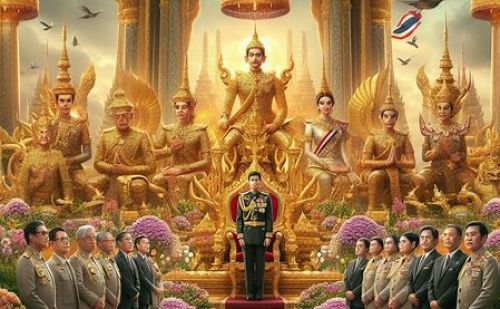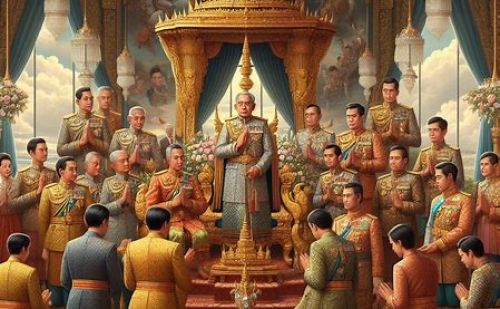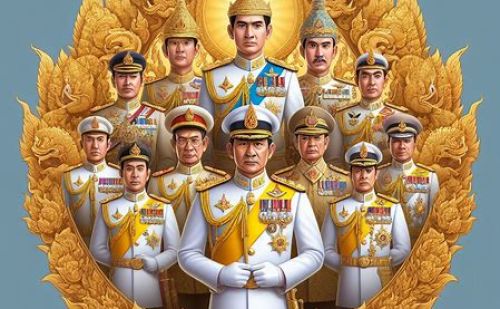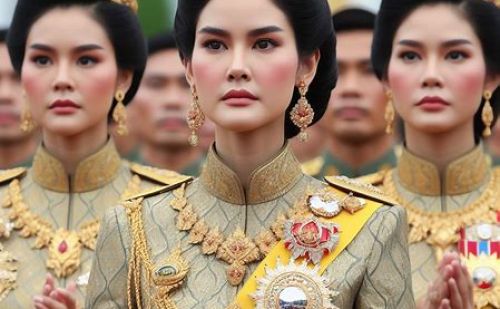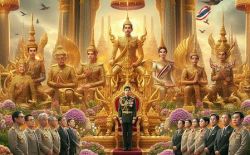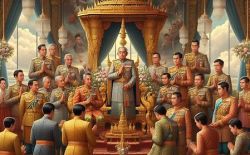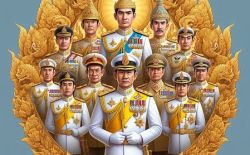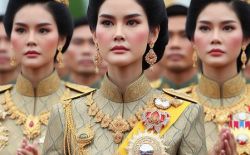Total respect for the Thai royal family
Total respect for the Thai royal family
I’m glad to hear that you respect the Thai royal family. They have a long and rich history that dates back to the 13th century. The current dynasty, the House of Chakri, was founded in 1782 by King Rama I, who moved the capital from Thonburi to Bangkok
The current king of Thailand is Maha Vajiralongkorn, also known as Rama X, who ascended the throne in 2016 after the death of his father, King Bhumibol Adulyadej, who reigned for 70 years and was widely revered by the Thai people
The king has three daughters and one son, but only his eldest daughter, Princess Bajrakitiyabha Mahidol, has a royal title and is considered a possible heir to the throne. She is a lawyer and diplomat who has served as Thailand’s ambassador to Austria and worked on various humanitarian causes. She is currently hospitalized due to a heart problem
The Thai royal family is deeply respected and protected by the law, which prohibits any criticism or insult of the monarchy. The Thai people often express their loyalty and devotion to the king and his family through various ceremonies and rituals
Some additional information or questions that I could add to my response are:
If you are interested in learning more about the Thai royal family, you can visit their official website [here].
What do you admire most about the Thai royal family?
Have you ever visited Thailand or seen any of the royal palaces?
What happens when you criticize the royal family in Thailand?
Criticizing the royal family in Thailand is a very serious offense that can result in imprisonment of up to 15 years for each count of lèse-majesté, the crime of insulting the monarchy or members of the royal family. This law is among the strictest in the world and prohibits any physical, spoken or written act that defames the royal institution. It also puts pressure on defendants to admit guilt to reduce the often draconian prison sentences
Thailand has revived this law in 2020 to curb months of anti-government protests that have challenged the role and power of the king and his family. Several activists have been summoned to face charges under the lèse-majesté law, while others have been arrested or harassed by the authorities. The protesters have demanded constitutional reforms, the dissolution of parliament, and an end to the harassment of activists. They have also called for reforms to the royal institution, such as trimming the monarchy’s budget, revoking the lèse-majesté law, and banning the palace from politics
The use of the lèse-majesté law has been criticized by human rights groups and international observers, who say it violates the freedom of expression and is used to silence dissent. However, the Thai government and the royalists have defended the law as necessary to protect the monarchy, which they regard as the pillar of national identity and stability
How do Thais feel about this law?
The lèse-majesté law is a very controversial and sensitive issue in Thailand, and there are different opinions and perspectives among the Thai people. Some of the possible views are:
Some Thais feel that the law is necessary to protect the monarchy, which they regard as the pillar of national identity and stability. They believe that the king and his family deserve respect and loyalty, and that any criticism or insult of the royal institution is a threat to the security of the state. They may also support the use of the law to suppress the anti-government protests that have challenged the role and power of the king and his family
Some Thais feel that the law is outdated, oppressive, and violates the freedom of expression and human rights. They believe that the monarchy should be accountable and transparent, and that the people should have the right to voice their opinions and demands for royal reform. They may also join or sympathize with the protesters who have called for constitutional reforms, the dissolution of parliament, and an end to the harassment of activists
Some Thais feel ambivalent or indifferent about the law, either because they are not interested in politics, or because they are afraid of the consequences of expressing their views. They may also avoid or ignore the issue, or try to find a middle ground between the two extremes
These are some of the possible views that Thais may have on the lèse-majesté law, but they are not exhaustive or representative of the whole population. The opinions and feelings of Thais may vary depending on their personal experiences, backgrounds, education, and exposure to information. Therefore, it is important to respect the diversity and complexity of the Thai society and not to generalize or stereotype anyone based on their views on this issue.
What is the history of lèse-majesté law in Thailand?
The history of lèse-majesté law in Thailand is complex and controversial. Lèse-majesté is the crime of insulting, defaming, or threatening the king, queen, heir-apparent, heir-presumptive, or regent of Thailand. It is punishable by up to 15 years in prison for each count. The law has been on the statute books since 1908, but its interpretation and enforcement have changed over time
According to some scholars, the law has its roots in the traditional concept of sacred kingship, which dates back to the 13th century and was influenced by Hinduism and Buddhism. The king was seen as a divine ruler who embodied the nation and protected the religion. Any disrespect or criticism of the king was considered a sin and a threat to the social order
However, other scholars argue that the law is a modern invention that was influenced by Western legal concepts and political interests. The law was first codified in 1908 by King Chulalongkorn, who wanted to modernize the country and assert his authority over the nobility and the clergy. The law was rarely used until the 1932 revolution, which ended the absolute monarchy and established a constitutional system. The law was then used by various factions to legitimize their claims to power and to suppress dissent
The law became more prominent and controversial after the 2006 coup, which ousted the elected government of Thaksin Shinawatra. The coup leaders claimed that they acted to protect the monarchy from Thaksin’s alleged disrespect and corruption. The law was then used to silence Thaksin’s supporters and critics of the monarchy, especially on the internet and social media. The law was also used to justify the 2014 coup, which overthrew the government of Yingluck Shinawatra, Thaksin’s sister
The law was suspended in 2020 by the order of King Vajiralongkorn, who succeeded his father King Bhumibol in 2016. However, the law was revived later that year to curb the anti-government protests that demanded reforms to the monarchy and the constitution. The law has been criticized by human rights groups and international observers, who say it violates the freedom of expression and is used to silence dissent
How does the Thai government justify this law?
The Thai government justifies the lèse-majesté law as a necessary measure to protect the monarchy, which is widely revered and respected by the Thai people. The government claims that the monarchy is one of the main pillars of the nation, closely linked to safeguarding the key national institutions and national security. The government also argues that the law reflects the culture and history of Thailand, where the king is seen as a divine ruler who embodies the nation and protects the religion
However, the government’s justification has been challenged by many critics, who say that the law violates the freedom of expression and is used to silence dissent and clamp down on protests. They also point out that the law is a modern invention that was influenced by Western legal concepts and political interests, and that it has been exploited as a political tool to undermine critics of the monarchy and the military-backed regime
How do Thais celebrate important events in the royal family?
Thais celebrate important events in the royal family with various ceremonies and rituals that reflect their culture and history. Some of the events that are celebrated are:
The coronation of the king, which is a complex and elaborate ceremony that involves the purification, anointing, crowning, and investiture of the monarch. The ceremony is a blend of Hindu and Buddhist traditions dating back several centuries. The most recent coronation of King Vajiralongkorn was held on 4 May 2019
The birthday of the king, which is also the national Father’s Day, on 28 July. The day is marked by public displays of loyalty and devotion to the king, such as wearing yellow shirts, lighting candles, singing the royal anthem, and offering alms to monks. The king also gives a speech to the nation and grants pardons to some prisoners
The birthday of the queen, which is also the national Mother’s Day, on 12 August. The day is celebrated in a similar way as the king’s birthday, with people wearing blue shirts, the queen’s color, and expressing their love and gratitude to the queen. The queen also gives a speech and grants scholarships to students
The anniversary of the accession of the king, which is on 1 December. The day is commemorated by religious ceremonies, cultural performances, and fireworks. The king also presides over a ceremony to honor the royal guards and bestow decorations and medals to distinguished citizens
What is the history of the Thai royal family?
The history of the Thai royal family is complex and fascinating. The current dynasty, the House of Chakri, was founded in 1782 by King Rama I, who moved the capital from Thonburi to Bangkok. The Chakri kings have ruled Thailand ever since, through various political and social changes, such as the end of absolute monarchy in 1932, the involvement in World War II, the Cold War, and the rise of democracy and constitutionalism
The Thai royal family is deeply revered and respected by the Thai people, who regard the king as the head of state, the head of the armed forces, the defender of Buddhism, and the upholder of all religions. The current king of Thailand is Maha Vajiralongkorn, also known as Rama X, who ascended the throne in 2016 after the death of his father, King Bhumibol Adulyadej, who reigned for 70 years and was widely loved by the Thai people
The king has three daughters and one son, but only his eldest daughter, Princess Bajrakitiyabha Mahidol, has a royal title and is considered a possible heir to the throne. She is a lawyer and diplomat who has served as Thailand’s ambassador to Austria and worked on various humanitarian causes. She is currently hospitalized due to a heart problem
The Thai royal family is also related to other royal families in the world, such as the British, Danish, and Swedish monarchies, through marriage and ancestry
What is the role of the Thai king?
The role of the Thai king is to serve as the head of state, the head of the Royal Thai Armed Forces, the adherent of Buddhism, and the upholder of religions. The king is also a symbol of national unity and stability, and a source of moral and spiritual guidance for the Thai people. The king has a constitutional role and exercises his powers through the parliament, the cabinet, and the courts. The king also has some discretionary powers, such as the right to be consulted, the right to encourage, and the right to warn. The king does not interfere in politics, but rather acts as a neutral and impartial arbiter

